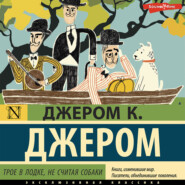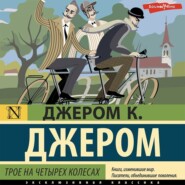По всем вопросам обращайтесь на: info@litportal.ru
(©) 2003-2024.
✖
They and I
Настройки чтения
Размер шрифта
Высота строк
Поля
I pointed out to Robina, kindly but firmly, the utter absurdity of her idea. How could I leave them, three helpless children, with no one to look after them? What would the Little Mother say? What might not Veronica be up to in my absence? There were other things to be considered. The donkey might arrive at any moment – no responsible person there to receive him – to see to it that his simple wants would be provided for. I should have to interview Mr. St. Leonard again to fix up final details as regarded Dick. Who was going to look after the cow, about to be separated from us? Young Bute would be down again with plans. Who was going to take him over the house, explain things to him intelligibly? The new boy might turn up – this simple son of the soil Miss Janie had promised to dig out and send along. He would talk Berkshire. Who would there be to understand him – to reply to him in dialect? What was the use of her being impetuous and talking nonsense?
She went on cutting sandwiches. She said they were not helpless children. She said if she and Dick at forty-two hadn’t grit enough to run a six-roomed cottage it was time they learned.
“Who’s forty-two?” I demanded.
“We are,” explained Robina, “Dick and I – between us. We shall be forty-two next birthday. Nearly your own age.”
“Veronica,” she continued, “for the next few days won’t be a child at all. She knows nothing of the happy medium. She is either herself or she goes to the opposite extreme, and tries to be an angel. Till about the end of the week it will be like living with a vision. As for the donkey, we’ll try and make him feel as much at home as if you were here.”
“I don’t mean to be rude, Pa,” Robina explained, “but from the way you put it you evidently regard yourself as the only one among us capable of interesting him. I take it he won’t mind for a night or two sharing the shed with the cow. If he looks shocked at the suggestion, Dick can knock up a partition. I’d rather for the present, till you come down again, the cow stopped where she was. She helps to wake me in the morning. You may reckon you have settled everything as far as Dick is concerned. If you talk to St. Leonard again for an hour it will be about the future of the Yellow Races or the possibility of life in Jupiter. If you mention terms he will be insulted, and if he won’t let you then you will be insulted, and the whole thing will be off. Let me talk to Janie. We’ve both of us got sense. As for Mr. Bute, I know all your ideas about the house, and I sha’n’t listen to any of his silly arguments. What that young man wants is someone to tell him what he’s got to do, and then let there be an end of it. And the sooner that handy boy turns up the better. I don’t mind what he talks. All I want him to do is to clean knives and fetch water and chop wood. At the worst I’ll get that home to him by pantomime. For conversation he can wait till you come down.”
That is the gist of what she said. It didn’t run exactly as I have put it down. There were points at which I interrupted, but Robina never listens; she just talks on, and at the end she assumes that, as a matter of course, you have come round to her point of view, and persuading her that you haven’t means beginning the whole thing over again.
She said I hadn’t time to talk, and that she would write and tell me everything. Dick also said he would write and tell me everything; and that if I felt moved to send them down a hamper – the sort of thing that, left to themselves, Fortnum & Mason would put together for a good-class picnic, say, for six persons – I might rely upon it that nothing would be wasted.
Veronica, by my desire, walked with me to the end of the lane. I talked to her very seriously. Her difficulty was that she had not been blown up. Had she been blown up, then she would have known herself she had done wrong. In the book it is the disobedient child that is tossed by the bull. The child that has been sent with the little basket to visit the sick aunt may be right in the bull’s way. That is a bit of bad luck for the bull. The poor bull is compelled to waste valuable time working round carefully, so as not to upset the basket. If the wicked child had sense (which in the book does not happen), it would, while the bull was dodging to get past the good child, seize the opportunity to move itself quickly. The wicked child never looks round, but pegs along steadily; and when the bull arrives it is sure to be in the most convenient position for receiving moral lessons. The good child, whatever its weight, crosses the ice in safety. The bad child may turn the scale at two stone lighter; the ice will have none of him. “Don’t you talk to me about relative pressure to the square inch,” says the indignant ice. “You were unkind to your little baby brother the week before last: in you go.” Veronica’s argument, temperately and courteously expressed, I admit, came practically to this:
“I may have acted without sufficient knowledge to guide me. My education has not, perhaps, on the whole, been ordered wisely. Subjects that I feel will never be of the slightest interest or consequence to me have been insisted upon with almost tiresome reiteration. Matters that should be useful and helpful to me – gunpowder, to take but one example – I have been left in ignorance concerning. About all that I say nothing; people have done their best according to their lights, no doubt. When, however, we come to purity of motives, singleness of intention, then, I maintain, I am above reproach. The proof of this is that Providence has bestowed upon me the seal of its approval: I was not blown up. Had my conduct been open to censure – as in certain quarters has been suggested – should I be walking besides you now, undamaged – not a hair turned, as the saying is? No. Discriminating Fate – that is, if any reliance at all is to be placed on literature for the young – would have made it her business that at least I was included in the débris. Instead, what do we notice! – a shattered chimney, a ruined stove, broken windows, a wreckage of household utensils; I, alone of all things, miraculously preserved. I do not wish to press the point offensively, but really it would almost seem that it must be you three – you, my dear parent, upon whom will fall the bill for repairs; Dick, apt to attach too much importance, maybe, to his victuals, and who for the next few days will be compelled to exist chiefly upon tinned goods; Robina, by nature of a worrying disposition, certain till things get straight again to be next door to off her head – who must, by reason of conduct into which I do not enquire, have merited chastisement at the hands of Providence. The moral lesson would certainly appear to be between you three. I – it grows clear to me – have been throughout but the innocent instrument.”
Admit the premise that to be virtuous is to escape whipping, the argument is logical. I felt that left uncombated it might lead us into yet further trouble.
“Veronica,” I said, “the time has come to reveal to you a secret: literature is not always a safe guide to life.”
“You mean – ” said Veronica.
“I mean,” I said, “that the writer of books is, generally speaking, an exceptionally moral man. That is what leads him astray: he is too good. This world does not come up to his ideas. It is not the world as he would have made it himself. To satisfy his craving for morality he sets to work to make a world of his own. It is not this world. It is not a bit like this world. In a world as it should be, Veronica, you would undoubtedly have been blown up – if not altogether, at all events partially. What you have to do, Veronica, is, with a full heart, to praise Heaven that this is not a perfect world. If it were I doubt very much, Veronica, your being here. That you are here happy and thriving proves that all is not as it should be. The bull of this world, feeling he wants to toss somebody, does not sit upon himself, so to speak, till the wicked child comes by. He takes the first child that turns up, and thanks God for it. A hundred to one it is the best child for miles around. The bull does not care. He spoils that pattern child. He’d spoil a bishop, feeling as he does that morning. Your little friend in the velvet suit who did get himself blown up, at all events as regards the suit – Which of you was it that thought of that gunpowder, you or he?”
Veronica claimed that the inspiration had been hers.
“I can easily believe it. And was he anxious to steal the gunpowder and put it on the fire, or did he have to be persuaded?”
Veronica admitted that in the qualities of a first-class hero he was wanting. Not till it had been suggested to him that he must at heart be a cowardy cowardy custard had he been moved to take a hand in the enterprise.
“A lad, clearly,” I continued, “that left to himself would be a comfort to his friends. And the story of the robbers – your invention or his?”
Veronica was generously of opinion that he might have thought of it had he not been chiefly concerned at the moment with the idea of getting home to his mother. As it was, the clothing with romance of incidents otherwise bald and uninteresting had fallen upon her.
“The good child of the story. The fact stands out at every point. His one failing an amiable weakness. Do you not see it for yourself; Veronica? In the book, you, not he, would have tumbled over the mat. In this wicked world it is the wicked who prosper. He, the innocent, the virtuous, is torn into rags. You, the villain of the story, escape.”
“I see,” said Veronica; “then whenever nothing happens to you that means that you’re a wrong ’un.”
“I don’t go so far as to say that, Veronica. And I wish you wouldn’t use slang. Dick is a man, and a man – well, never mind about a man. You, Veronica, must never forget that you’re a lady. Justice must not be looked for in this world. Sometimes the wicked get what they deserve. More often they don’t. There seems to be no rule. Follow the dictates of your conscience, Veronica, and blow – I mean be indifferent to the consequences. Sometimes you’ll come out all right, and sometimes you won’t. But the beautiful sensation will always be with you: I did right. Things have turned out unfortunately: but that’s not my fault. Nobody can blame me.”
“But they do,” said Veronica, “they blame you just as if you’d meant to go and do it.”
“It does not matter, Veronica,” I pointed out, “the opinion of the world. The good man disregards it.”
“But they send you to bed,” persisted Veronica.
“Let them,” I said. “What is bed so long as the voice of the inward Monitor consoles us with the reflection – ”
“But it don’t,” interrupted Veronica; “it makes you feel all the madder. It does really.”
“It oughtn’t to,” I told her.
“Then why does it?” argued Veronica. “Why don’t it do what it ought to?”
The trouble about arguing with children is that they will argue too.
“Life’s a difficult problem, Veronica,” I allowed. “Things are not as they ought to be, I admit it. But one must not despair. Something’s got to be done.”
“It’s jolly hard on some of us,” said Veronica. “Strive as you may, you can’t please everyone. And if you just as much as stand up for yourself, oh, crikey!”
“The duty of the grown-up person, Veronica,” I said, “is to bring up the child in the way that it should go. It isn’t easy work, and occasionally irritability may creep in.”
“There’s such a lot of ’em at it,” grumbled Veronica. “There are times, between ’em all, when you don’t know whether you’re standing on your head or your heels.”
“They mean well, Veronica,” I said. “When I was a little boy I used to think just as you do. But now – ”
“Did you ever get into rows?” interrupted Veronica.
“Did I ever? – was never out of them, so far as I can recollect. If it wasn’t one thing, then it was another.”
“And didn’t it make you wild?” enquired Veronica, “when first of all they’d ask what you’d got to say and why you’d done it, and then, when you tried to explain things to them, wouldn’t listen to you?”
“What used to irritate me most, Veronica,” I replied – “I can remember it so well – was when they talked steadily for half an hour themselves, and then, when I would attempt with one sentence to put them right about the thing, turn round and bully-rag me for being argumentative.”
“If they would only listen,” agreed Veronica, “you might get them to grasp things. But no, they talk and talk, till at the end they don’t know what they are talking about themselves, and then they pretend it’s your fault for having made them tired.”
“I know,” I said, “they always end up like that. ‘I am tired of talking to you,’ they say – as if we were not tired of listening to them!”
“And then when you think,” said Veronica, “they say you oughtn’t to think. And if you don’t think, and let it out by accident, then they say ‘why don’t you think?’ It don’t seem as though we could do right. It makes one almost despair.”
“And it isn’t even as if they were always right themselves,” I pointed out to her. “When they knock over a glass it is, ‘Who put that glass there?’ You’d think that somebody had put it there on purpose and made it invisible. They are not expected to see a glass six inches in front of their nose, in the place where the glass ought to be. The way they talk you’d suppose that a glass had no business on a table. If I broke it, then it was always, ‘Clumsy little devil! ought to have his dinner in the nursery.’ If they mislay their things and can’t find them, it’s, ‘Who’s been interfering with my things? Who’s been in here rummaging about?’ Then when they find it they want to know indignantly who put it there. If I could not find a thing, for the simple reason that somebody had taken it away and put it somewhere else, then wherever they had put it was the right place for it, and I was a little idiot for not knowing it.”
“And of course you mustn’t say anything,” commented Veronica. “Oh, no! If they do something silly and you just point it out to them, then there is always a reason for it that you wouldn’t understand. Oh, yes! And if you make just the slightest mistake, like what is natural to all of us, that is because you are wicked and unfeeling and don’t want to be anything else.”
“I will tell you what we will do, Veronica,” I said; “we will write a book. You shall help me. And in it the children shall be the wise and good people who never make mistakes, and they shall boss the show – you know what I mean – look after the grown-up people and bring them up properly. And everything the grown-up people do, or don’t do, will be wrong.”
Veronica clapped her hands. “No, will you really?” she said. “Oh, do.”
“I will really,” I answered. “We will call it a moral tale for parents; and all the children will buy it and give it to their fathers and mothers and such-like folk for their birthdays, with writing on the title-page, ‘From Johnny, or Jenny, to dear Papa, or to dear Aunty, with every good wish for his or her improvement!’”
“Do you think they will read it?” doubted Veronica.
“We will put in it something shocking,” I suggested, “and get some paper to denounce it as a disgrace to English literature. And if that won’t do it we will say it is a translation from the Russian. The children shall stop at home and arrange what to have for dinner, and the grown-up people shall be sent to school. We will start them off each morning with a little satchel. They shall be made to read ‘Grimm’s Fairy Tales’ in the original German, with notes; and learn ‘Old Mother Hubbard’ by heart and explain the grammar.”
“And go to bed early,” suggested Veronica.

















